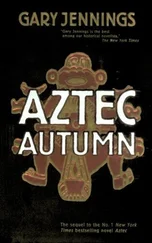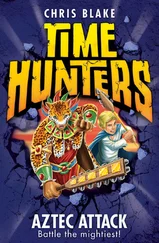Gary Jennings - Aztec
Здесь есть возможность читать онлайн «Gary Jennings - Aztec» весь текст электронной книги совершенно бесплатно (целиком полную версию без сокращений). В некоторых случаях можно слушать аудио, скачать через торрент в формате fb2 и присутствует краткое содержание. Жанр: Старинная литература, на английском языке. Описание произведения, (предисловие) а так же отзывы посетителей доступны на портале библиотеки ЛибКат.
- Название:Aztec
- Автор:
- Жанр:
- Год:неизвестен
- ISBN:нет данных
- Рейтинг книги:4 / 5. Голосов: 1
-
Избранное:Добавить в избранное
- Отзывы:
-
Ваша оценка:
- 80
- 1
- 2
- 3
- 4
- 5
Aztec: краткое содержание, описание и аннотация
Предлагаем к чтению аннотацию, описание, краткое содержание или предисловие (зависит от того, что написал сам автор книги «Aztec»). Если вы не нашли необходимую информацию о книге — напишите в комментариях, мы постараемся отыскать её.
"Anyone who reads, anyone who still lusts for adventure or that book you can't put down, will glory in Aztec."--Los Angeles Times
Aztec
Aztec
Aztec — читать онлайн бесплатно полную книгу (весь текст) целиком
Ниже представлен текст книги, разбитый по страницам. Система сохранения места последней прочитанной страницы, позволяет с удобством читать онлайн бесплатно книгу «Aztec», без необходимости каждый раз заново искать на чём Вы остановились. Поставьте закладку, и сможете в любой момент перейти на страницу, на которой закончили чтение.
Интервал:
Закладка:
He spoke directly to me again: "Head Nodder, your Aztéca ancestors brought nothing to this valley: no ancient wisdom, no arts, no sciences, no culture. They brought nothing but themselves: a skulking, ignorant, nomad people who wore ragged animal skins crawling with vermin, and who worshiped a loathsomely pugnacious god of slaughter and bloodshed. That rabble was despised and repulsed by every other already developed nation hereabout. Would any civilized people welcome an invasion of uncouth beggars? The Aztéca did not settle on that island in the lakeside swamp because their god gave them any sign, and they did not go there joyfully. They went because there was nowhere else to go, and because no one else had cared to claim that pimple of land surrounded by marshes."
My classmates watched me from the corners of their eyes. I tried not to flinch under Neltitica's words.
"They did not immediately build great cities, or anything else; they had to spend all their time and energy just in finding something to eat. They were not allowed to fish, for the lake's fishing rights belonged to the nations about it. So for a long time your ancestors existed—just barely existed—by eating revolting little things like worms and water insects, and the slimy eggs of those creatures, and the only edible plant that grew in that miserable swamp. It was mexixin, the common cress or peppergrass, a scraggly and bitter-tasting weed. But if your forebears had nothing else, Head Nodder, they had a mordant sense of humor. They began to call themselves, with wry irony, the Mexíca."
The very name evoked another knowing snicker from the class. Neltitica went on:
"Eventually the Mexíca devised the chinamitl system of growing decent crops. But even then, they grew for themselves only a necessary minimum of staple foods like maize and beans. Their chinampa were mainly used for growing more rare vegetables and herbs—tomatoes, sage, coriander, sweet potatoes—which their lofty neighbors could not be bothered to cultivate. And the Mexíca traded those delicacies for the necessities of life: the tools and building materials and cloth and weapons that the mainland nations would otherwise have been unwilling to give them. From then on, they made rapid progress toward civilization and culture and military might. But they never forgot that humble weed which had sustained them in the beginning, the mexixin, and they never afterward abandoned the name they had adopted from it. Mexíca is a name now known and respected or feared throughout our world, but it means only..."
He paused on purpose, and he smiled, and my face flamed again, as the entire class shouted in concert: "The Weed People!"
"I understand, young lordlet, that you have essayed some learning of reading and writing on your own," said the Lord Teacher of Word Knowing, somewhat sourly, as if he believed any such self-education impossible. "And I understand that you have brought examples of your work."
Respectfully, I handed him the long, pleated-together bark paper strip of which I was most proud. I had drawn it with extra care, and painted it in the vibrant colors Chimali had given me. The Lord Teacher took the compacted book and began slowly to unfold its pages.
It was an account of one famous incident in the history of the Mexíca, when they first arrived in this valley, and when the most powerful nation here was that of the Culhua. The Culhua leader, Coxcox, had declared a war against the people of Xochimilco, and invited the newcome Mexíca to fight as his allies. When the war was won and the Culhua warriors brought in their Xochimilca prisoners, the Mexíca brought none at all, and Coxcox denounced them as cowards. At that, the Mexíca warriors opened the bags they carried and dumped out a mountain of ears—all left ears—which they had sliced from the multitude of Xochimilca they had vanquished. Coxcox was astounded, and glad, and from then on the Mexíca were accounted fighters to be reckoned with.
I thought I had done a very good job of picturing the incident, particularly in my meticulous rendering of the innumerable left ears and the expression of astonishment on the face of Coxcox. I waited, almost aglow with self-congratulation, for the Lord Teacher to praise my work.
But he was frowning as he flipped the book's pages apart, and he looked from one side to the other of the pleated strip, and he said at last, "In which direction am I supposed to read this?"
Puzzled, I said, "In Xaltócan, my lord, we unfold the pages leftward. That is, so we may read each panel from left to right."
"Yes, yes!" he snapped. "We all customarily read from left to right. But your book gives no indication that we should do so."
"Indication?" I said.
"Suppose you are bidden to write an inscription that must be read in some other direction—on a temple frieze or column, for instance, where the architecture requires that it be read from right to left, or even from top to bottom."
The possibility had never occurred to me, and I said so.
He said impatiently, "When a scribe pictures two persons or two gods conversing, naturally they must be face to face. But there is one basic rule. The majority of all the characters must face in the direction the writing is to be read."
I think I gulped loudly.
"You never grasped that simplest rule of picture writing?" he asked scathingly. "And you have the effrontery to show me this?" He tossed it back to me without even refolding it. "When you attend your first class in word knowing tomorrow, join that one yonder."
He pointed across the lawn to a class assembling about one of the pavilions, and my face fell and my pride evaporated. Even from a distance, I could make out that all the students were about half my size and age.
It was mortifying to have to sit among infants—to begin at the very beginning in both my history and my word knowing classes—as if I had never been taught anything at all, as if I had never exerted myself to learn anything at all.
So I was cheered to discover that the study of poetry, at least, was not graded into the Beginners, the Learners, the Somewhat Learned, and so on, with me at the very bottom of the class. There was only a single gathering of aspiring poets, and they included students much older as well as much younger than myself. Among them were both the young Prince Willow and his elder half brother Crown Prince Black Flower; there were other nobles ranging even to the very old; there were both girls and women of the nobility; there were more slaves than I had seen in any other class.
It seems that it matters not who makes a poem, and it matters not what kind of poem: a tribute to some god or hero, a lengthy historical account, a love song, a lamentation, or a joking bit of banter. That poem is not judged according to the poet's age, sex, social standing, education, or experience. A poem merely is or is not. It lives or it never existed. It is made and remembered or it is forgotten so quickly that it might never have been made at all. In that class I was content to sit and listen, timorous of attempting any poetic ventures of my own. It was not until many, many years later that I happened to make a poem which I have since heard recited by strangers. So that one has lived, but it is a very small poem, and I would not call myself a poet on that account.
What I recollect most vividly about my poetry class is the first time I attended it. Some distinguished visitor had been invited by the Lord Teacher to read his works, and he was just about to begin when I arrived and sat down on a grassy bank at the rear of the crowd. I could not see him too distinctly at that distance, but I could make out that he was medium tall and well built, that he was about the age of the Lady of Tolan, that he wore a richly embroidered cotton mantle held by a gold clasp, and no other adornments to designate his office or class. So I took him to be a professional poet of sufficient talent to have been rewarded with a pension and a place at court.
Читать дальшеИнтервал:
Закладка:
Похожие книги на «Aztec»
Представляем Вашему вниманию похожие книги на «Aztec» списком для выбора. Мы отобрали схожую по названию и смыслу литературу в надежде предоставить читателям больше вариантов отыскать новые, интересные, ещё непрочитанные произведения.
Обсуждение, отзывы о книге «Aztec» и просто собственные мнения читателей. Оставьте ваши комментарии, напишите, что Вы думаете о произведении, его смысле или главных героях. Укажите что конкретно понравилось, а что нет, и почему Вы так считаете.











